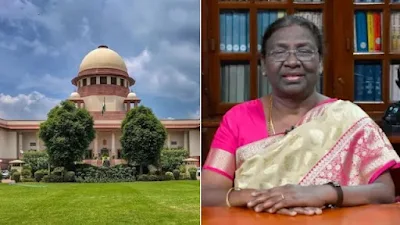In a pointed rejoinder to the Supreme Court's recent ruling on fixed timelines for constitutional authorities to act on state legislation, President Droupadi Murmu on Wednesday raised fundamental questions about the judiciary's jurisdiction in prescribing such deadlines. The President questioned how the Supreme Court could issue a directive on a matter where the Constitution itself does not lay down specific timeframes.
This response follows an April 2025 verdict by a Supreme Court bench comprising Justices J.B. Pardiwala and R. Mahadevan. The ruling permitted judicial intervention in cases where Governors unduly delay assent to Bills passed by state legislatures. Further, the Court held that the President must decide within a three-month window on Bills referred for assent by state Governors.
During her remarks on Tuesday, President Murmu posed a series of constitutional queries to the judiciary, challenging the scope of its April decision:
- Can the Supreme Court override the constitutional powers of the President and Governors using Article 142?
- Are certain states attempting to exploit the Court’s plenary powers to act against the Centre?
- What constitutional basis allows for the imposition of a timeline on the President or a Governor in granting or withholding assent?
- What are the specific options available to a Governor when a Bill is presented under Article 200 of the Constitution?
Referencing Articles 200 and 201, which pertain respectively to the Governor’s and President’s role in the legislative process, the President emphasized that the Constitution provides no explicit timelines or procedural requirements for granting or denying assent to state Bills.
The Supreme Court’s ruling earlier this year arose from a plea by the Tamil Nadu government in November 2023. The state had challenged its Governor’s indefinite delay in acting on 10 Bills passed by the state Assembly—some dating back to 2020. In its verdict, the Court struck down the Governor’s inaction and ruled that once such Bills are reserved for the President, a decision must be taken within a three-month period.
While the judiciary's decision was hailed by some as a step toward curbing executive inaction, President Murmu’s response underscores a larger constitutional debate—one that touches on the separation of powers between the judiciary and the executive, and the autonomy of constitutional functionaries in a federal framework.
As the conversation around the interpretation of Articles 200 and 201 gains momentum, the President’s intervention marks a significant moment in the evolving dialogue between India’s constitutional institutions.




.png)
The opinions posted here do not belong to 🔰www.indiansdaily.com. The author is solely responsible for the opinions.
As per the IT policy of the Central Government, insults against an individual, community, religion or country, defamatory and inflammatory remarks, obscene and vulgar language are punishable offenses. Legal action will be taken for such expressions of opinion.